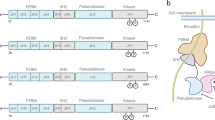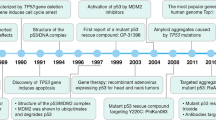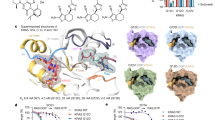Abstract
Prostate cancer is one of the most prominent malignancies of elderly men in many Western countries including Europe and the United States with increasing trend worldwide. The growth of normal prostate as well as of prostate carcinoma cells depends on functional androgen receptor (AR) signaling. AR manifests the biological actions of androgens and its transcriptional activity is known to be influenced by signal transduction pathways. Here we show that Src, a nonreceptor tyrosine kinase, is overexpressed in androgen-independent prostate carcinoma C4-2 cells. Interestingly, the expression of Src was found to progressively increase (up to threefold) in transgenic adenocarcinoma of mouse prostate mice as a function of age and cancer progression. Blocking Src kinase function by a specific inhibitor, PP2, resulted in decreased AR transactivation function on two different reporters, mouse mammary tumor virus (MMTV) and prostate-specific antigen (PSA). Consistent with this, overexpression of a functional Src mutant also led to a dramatic decrease in AR transactivation potential in a hormone-dependent manner. Interference with Src function in C4-2 cells led to decreased recruitment of AR on the target gene PSA enhancer and also resulted in the abrogation of hormone-dependent PSA transcript induction. Src inhibition also led to a dramatic decrease in the cell invasion in addition to decreasing the cellular growth. We suggest that targeting Src kinase could be an effective strategy to inhibit prostate cancer growth and metastasis.
This is a preview of subscription content, access via your institution
Access options
Subscribe to this journal
Receive 50 print issues and online access
$259.00 per year
only $5.18 per issue
Buy this article
- Purchase on Springer Link
- Instant access to full article PDF
Prices may be subject to local taxes which are calculated during checkout






Similar content being viewed by others
References
Abreu-Martin MT, Chari A, Palladino AA, Craft NA, Sawyers CL . (1999). Mitogen activated protein kinase kinase kinase 1 activates androgen receptor-dependent transcription and apoptosis in prostate cancer. Mol Cell Biol 19: 5143–5154.
Adhami VM, Siddiqui IA, Ahmad N, Gupta S, Mukhtar H . (2004). Oral consumption of green tea polyphenols inhibits insulin-like growth factor-I-induced signaling in an autochthonous mouse model of prostate cancer. Cancer Res 64: 8715–8722.
Baniahmad A . (2005). Nuclear hormone receptor co-repressors. J Steroid Biochem Mol Biol 93: 89–97.
Brinkmann AO, Jenster G, Kuiper GG, Ris C, van Laar JH, van der Korput JA et al. (1992). The human androgen receptor: structure/function relationship in normal and pathological situations. J Steroid Biochem Mol Biol 41: 361–368.
Castoria G, Lombardi M, Barone MV . (2003). Androgen-stimulated DNA synthesis and cytoskeletal changes in fibroblasts by a nontranscriptional receptor action. J Cell Biol 161: 547–556.
Chen CD, Welsbie DS, Tran C, Baek SH, Chen R, Vessella R et al. (2004). Molecular determinants of resistance to antiandrogen therapy. Nat Med 10: 33–39.
Chen S, Song CS, Lavrovsky Y, Bi B, Vellanoweth R, Chatterjee B et al. (1998). Catalytic cleavage of the androgen receptor messenger RNA and functional inhibition of androgen receptor activity by a hammerhead ribozyme. Mol Endocrinol 12: 1558–1566.
Craft N, Shostak Y, Carey M, Sawyers CL . (1999). A mechanism for hormone-independent prostate cancer through modulation of androgen receptor signaling by the HER2/neu tyrosine kinase. Nat Med 5: 280–285.
Culig Z, Hobisch A, Cronauer MV, Radmayr C, Trapman J, Hittmair A et al. (1994). Androgen receptor activation in prostatic tumor cell lines by insulin-like growth factor-I, keratinocyte growth factor, and epidermal growth factor. Cancer Res 54: 5474–5478.
Dehm SM, Tindall DJ . (2007). Androgen receptor structural and functional elements: role and regulation in prostate cancer. Mol Endocrinol 21: 2855–2863.
Dotzlaw H, Moehren U, Mink S, Cato AC, Iniguez Lluhi JA, Baniahmad A . (2002). The amino terminus of the human AR is target for corepressor action and antihormone agonism. Mol Endocrinol 16: 661–673.
Greenberg NM, DeMayo F, Finegold MJ, Medina D, Tilley WD, Aspinall JO et al. (1995). Prostate cancer in a transgenic mouse. Proc Natl Acad Sci USA 92: 3439–3443.
Guo Z, Dai B, Jiang T, Xu K, Xie Y, Kim O et al. (2006). Regulation of androgen receptor activity by tyrosine phosphorylation. Cancer Cell 10: 309–319.
Haag P, Bektic J, Bartsch G, Klocker H, Eder IE . (2005). Androgen receptor down regulation by small interference RNA induces cell growth inhibition in androgen sensitive as well as in androgen-independent prostate cancer cells. J Steroid Biochem Mol Biol 96: 251–258.
Isaacs JT . (2000). Apoptosis: translating theory to therapy for prostate cancer. J Natl Cancer Inst 92: 1367–1369.
Jenster G . (2000). Ligand-independent activation of the androgen receptor in prostate cancer by growth factors and cytokines. J Pathol 191: 227–228.
Jia L, Coetzee GA . (2005). Androgen receptor-dependent PSA expression in androgen-independent prostate cancer cells does not involve androgen receptor occupancy of the PSA locus. Cancer Res 65: 8003–8008.
Liao X, Tang S, Thrasher JB, Griebling TL, Li B . (2005). Small-interfering RNA-induced androgen receptor silencing leads to apoptotic cell death in prostate cancer. Mol Cancer Ther 4: 505–515.
Moehren U, Papaioannou M, Reeb CA, Hong W, Baniahmad A . (2007). Alien interacts with the human androgen receptor and inhibits prostate cancer cell growth molecular endocrinology. Mol Endocrinol 21: 1039–1048.
Notini AJ, Davey RA, McManus JF, Bate KL, Zajac JD . (2005). Genomic actions of the androgen receptor are required for normal male sexual differentiation in a mouse model. J Mol Endocrinol 35: 547–555.
Perry JE, Grossmann ME, Tindall DJ . (1996). Androgen regulation of gene expression. Prostate Suppl 6: 79–81.
Peterziel H, Mink S, Schonert A, Becker M, Klocker H, Cato AC . (1999). Rapid signalling by androgen receptor in prostate cancer cells. Oncogene 18: 6322–6329.
Sadar MD . (1999). Androgen-independent induction of prostate-specific antigen gene expression via cross-talk between the androgen receptor and protein kinase A signal transduction pathways. J Biol Chem 274: 7777–7783.
Shah YM, Rowan BG . (2005). The Src kinase pathway promotes tamoxifen agonist action in Ishikawa endometrial cells through phosphorylation-dependent stabilization of estrogen receptor (alpha) promoter interaction and elevated steroid receptor coactivator 1 activity. Mol Endocrinol 19: 732–748.
Siddiqui IA, Zaman N, Aziz MH, Reagan-Shaw SR, Sarfaraz S, Adhami VM et al. (2006). Inhibition of CWR22Rnu1 tumor growth and PSA secretion in athymic nude mice by green and black teas. Carcinogenesis 27: 833–839.
Thalmann GN, Anezinis PE, Chang SM, Zhau HE, Kim EE, Hopwood VL et al. (1994). Androgen-independent cancer progression and bone metastasis in the LNCaP model of human prostate cancer. Cancer Res 54: 2577–25781.
Thalmann GN, Sikes RA, Wu TT, Degeorges A, Chang SM, Ozen M et al. (2000). LNCaP progression model of human prostate cancer: androgen-independence and osseous metastasis. Prostate 44: 91–103.
Ueda T, Mawji NR, Bruchovsky N, Sadar MD . (2002). Ligand-independent activation of the androgen receptor by interleukin-6 and the role of steroid receptor coactivator-1 in prostate cancer cells. J Biol Chem 277: 38087–38094.
Wang L, Hsu CL, Ni J, Wang PH, Yeh S, Keng P, Chang C . (2004). Human checkpoint protein hRad9 functions as a negative coregulator to repress androgen receptor transactivation in prostate cancer cells. Mol Cell Biol 24: 2202–2213.
Young CY, Andrews PF, Montgomery BT, Tindall DJ . (1992). Tissue-specific and hormonal regulation of human prostate-specific glandular kallikrein. Biochemistry 31: 818–824.
Acknowledgements
We thank Dr GP Reddy for gift of Casodex, Dr GN Thalmann for providing C4-2 cells and Dr Sarah Courtneidge for mammalian expression vectors of wt and mutant Src. This work was supported by US PHS Grants RO1CA78809; RO1CA101039, RO1CA120451 and O'Brian center Grant P50DK065303-01 to HM and Association of International Cancer research (AICR, UK) and DFG-BA1457/3 grant to AB.
Author information
Authors and Affiliations
Corresponding authors
Rights and permissions
About this article
Cite this article
Asim, M., Siddiqui, I., Hafeez, B. et al. Src kinase potentiates androgen receptor transactivation function and invasion of androgen-independent prostate cancer C4-2 cells. Oncogene 27, 3596–3604 (2008). https://doi.org/10.1038/sj.onc.1211016
Received:
Revised:
Accepted:
Published:
Issue Date:
DOI: https://doi.org/10.1038/sj.onc.1211016
Keywords
This article is cited by
-
Delineating the role of nuclear receptors in colorectal cancer, a focused review
Discover Oncology (2024)
-
CDK6 is upregulated and may be a potential therapeutic target in enzalutamide-resistant castration-resistant prostate cancer
European Journal of Medical Research (2022)
-
Identification of evodiamine as a suppressor of prostate cancer progression by reducing AR transcriptional activity via targeting Src
Endocrine (2022)
-
SHH-N non-canonically sustains androgen receptor activity in androgen-independent prostate cancer cells
Scientific Reports (2021)
-
A reciprocal feedback between the PDZ binding kinase and androgen receptor drives prostate cancer
Oncogene (2019)



